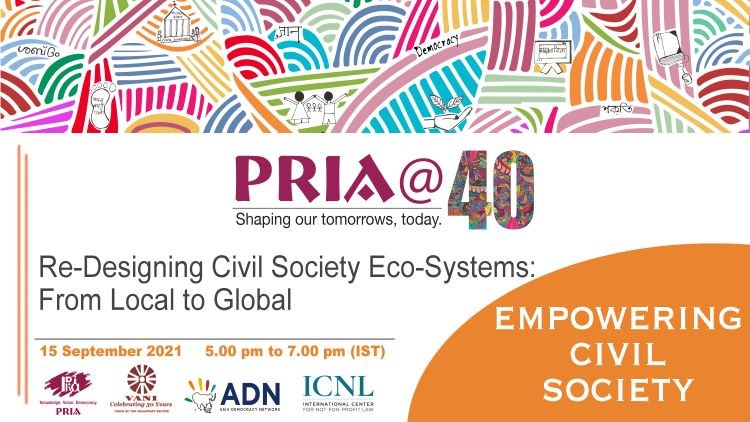Conversation on Re-designing Civil Society Eco-Systems: From Local to Global on 15 September 2021; 5.00 pm to 7.00 pm
As PRIA approaches its 40th Anniversary in February 2022, we are co-convening conversations on several thematic areas in which PRIA has worked:
- Sustainable urban future
- Empowering civil society
- Decentralised community governance
- Making the gender leap
- Citizen participation
- Building a knowledge democracy

The COVID-19 pandemic has disrupted lives everywhere around the globe. It has also exposed the inequalities between and within countries. The magnitude of inequalities in terms of access to health services, educational opportunities, employment and livelihood has affected the poor and marginalised at a phenomenal scale. As the pandemic unfolded in several waves, while the national and sub-national governments grappled to scramble and mobilise state machinery to address the needs of affected communities, the local civil society stood out to be the first responders. Over the months, stories emerge from the ground, country by country, how civil society mobilised meagre but crucial resources to provide comfort to the affected communities to the best of their abilities.
Since the last decade, as we have been witnessing continuous erosion of democratic ideals and institutions across the world, one of the most prominent victims has been the civil society – particularly those who have been defending democratic rights of the most marginalised. As adverse effect of pandemic on the prospect of achieving Sustainable Development Goals (SDGs) and Climate Action Agenda is evident and the critical role that civil society can play to bring these global agendas back on track, this is bewildering that most national governments continue with regressive steps that put further constraints to the functioning of civil society.
A large section of civil society, while are open to embrace partnership with the national and sub-national governments, international donors, domestic and international philanthropic communities, and private sectors, they are deliberately constrained by regressive laws, interrupted funding, and an overall abusive environment. The relevance of civil society’s contribution can be best viewed as numerous forms of partnerships between different stakeholders with shared vision of equality and dignity.
A number of global and local studies undertaken during the pandemic highlighted the concerns of civil society with regard to access to predictable resources, well-being of their staff and volunteers, unilateral decisions by the donors, lack of cooperation and regressive laws and policies. Continuous erosion of civic space and backsliding of democracy have exacerbated the situation which need positive reversal.
As Participatory Research in Asia (PRIA) approaches its 40th Anniversary in February 2022, we are co-convening a Samvad – Conversation on Re-designing Civil Society Eco-System: From Local to Global on 15 September 2021 between 5.00 p.m. and 7.00 p.m. IST, in collaboration with International Centre for Non-Profit Law (ICNL), USA; Asia Democracy Network (ADN), South Korea/ Thailand and Voluntary Action Network India (VANI).
The Samvad – Conversation will explore the following key questions:
- How has pandemic affected the eco-system in which civil society operates? What impact these effects have on the effectiveness of civil society?
- What strategies civil society should consider to enable its operating environment?
- What policies and actions government and other stakeholders should consider to enable environment for civil society functioning?
Please REGISTER for the event. On registering, we will send a Zoom link via email (at the email address provided in the registration form), which will give you access to the event.
Programme At A Glance
|
Welcome and Introduction to PRIA@40 Programmes and Conversation |
|
Setting the Stage
|
|
Recommendations from the Sub Regional Consultations for Asia Democracy Assembly 2021
|
|
Deep Dive Conversation and Open Discussion
|
|
Key Takeaways
|
Moderator: Dr Kaustuv Kanti Bandyopadhyay, Director, Participatory Research in Asia (PRIA), India
|
|
- PASCAL Activities:
- PASCAL Themes:
 Printer-friendly version
Printer-friendly version- Login to post comments
- Calendar



